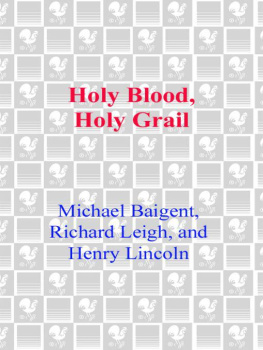T he Holy Grail! What a strange and alluring kaleidoscope of images and thoughts gather about those two words! From King Arthur to Monty Python, from T. S. Eliot to Richard Wagner, every era since at least the 1100s has produced stories, songs, and images centering upon this mysterious theme. Once the object of chivalric quests and holy pilgrimages, it has become in recent years the sacred totem of several esoteric and New Age movements. But what was it really? Does it have any significance for twenty-first-century Catholics?
In this book, we shall look at the foundational romances concerning the Grail and their relationship to actual history. Several vessels claimed to be the mysterious thing itself shall be examined, as well as other objects associated with it, from the instruments of Christs passion to His burial clothesall enshrined in different places. The relationship of the Grail to knighthood, the Crusades, the Holy Eucharist, and devotion to the Precious Blood, the Sacred Heart, the Blessed Virgin, and the Kingship of Christ shall be examined, as will their role in the creation in various places of a more modern Catholic militancy infused with the spirit of chivalry in such places as the Vendee, Tyrol, Spain, and Mexico.
The importance of the Grail today outside the Church shall also be looked at, with a view to determining whether and how it can be used as a means of bringing non-Catholics to Christ and to Catholicism. Its possible role in reigniting evangelistic fervor among Catholics shall also be looked at, not only in terms of the missionary impulse, but in terms of sparking a renewed zeal for souls and reverence for and use of the sacraments as well.
In a word, this book shall attempt to show that the Holy Grail, both as a reality and as a symbol, remains as important today as it ever has been and that the quest for it can lead the individual as far away as Spain, England, and Jerusalemor as close to home as ones own parish church. Perceval and Galahad, we shall follow the Holy Grail wherever the Quest leads us regardless of the cost! But first, I invite you to enter into the lore of the Grail through reading the prelude, which is an amalgam of received versions. It is my hope that you enjoy it and that it whets your appetite and gives you the necessary background knowledge to learn more about the Holy Grail in the pages that follow.
Charles A. Coulombe
Monrovia, California
St. Georges Day, 2017
P erceval was raised by his mother deep in the woods, away from all other human contact. She taught him his faith, and his letters, and warned him to stay away from other people and not to ask questions. But one day, he was out wandering in the woods and encountered a group of men in armor. At first he thought they were angels, so handsome were their faces and so gleaming their metal clothes. But they told him they were in fact knights, a word he had certainly never heard before. But these knights told him that, despite his rude clothing, he had the look of a knight himself and reminded them of someone; they could not recall whom. They invited him to accompany them back to Camelot, the city of their king, Arthur, where dwelt many fine knights. Perhaps, they said to him, he could in time become one himself. Without a second thought or warning his mother, he left with the knights for Camelot immediately.
The Camelot to which Perceval came was beautifulon the surface. Brave knights jousted, the ladies of the court were beautiful, the feasts of the Church were celebrated brilliantly, justice and order reigned, and over all presided King Arthur and his beautiful queen, Guinevere. But dark currents ran underneath. The queens adultery with Lancelot, though known to few, ate like a cancer at the heart of the court. The kings half sister, Morgan le Fay, plotted his downfall and had engineered the birth of an illegitimate and incestuous son for him on their sister Morgause; Morgan was training the lad, Mordred, to be the instrument of Arthurs ruin. Beyond that, many of Arthurs knights were not what they had been: an uncomfortable fact pointed up openly a few years previously one Christmastide when an uncanny Green Knight had challenged the entirety of Camelots chivalry, with only one beardless youth, Gawain, to accept.
But none of this was apparent to Perceval. Arthur accepted him as a candidate for knighthood, and he very quickly acquired all the basic skills in fighting he would need as though he had been born to it. After his knighting, he went forth in search of adventure, as was the custom in those days. He fought robber knights, rescued damsels in distress, and fought off wild beasts. At last he came to a district where all was barren. The villages were empty, the fields fallow and overgrown, and he heard only the clopping of his horses hooves and the calling of crows as they hurriedly flew out of the area. Finally, the road took him to a castle that, unlike the rest of that country, gave every sign of being prosperous and inhabited. He rode up to its gate, was challenged by the sentries, and gave his name and that of Arthur, his lord. There was a burst of trumpets, the drawbridge lowered, and he cantered in. A well-dressed maiden came out to greet him with her servants; he asked her, What is this place called? She replied, Monsalvatch, the Castle of the Holy Grail, my lord.
He was ushered into a great hall, where a regal figure, wounded in the legs, begged forgiveness for not rising due to his wound. He was, as it transpired, the king of this castle and all the land round. He invited Sir Perceval to stay for dinner and to sleep overnight. The knight accepted. Trumpets sounded again, and a number of knights entered and took their places at the tables in the great hall. At that, a procession of maidens entered the room; at their head was one who carried a spear from which flowed into the vessel carried by another an endless stream of blood; behind her was the first maiden he encountered bearing a shimmering golden vessel; she brought it to the wounded king, and first a Host floated from it into his mouth, and then the chalice filled with wine, from which he drank. Sir Perceval was much taken aback by all of this and wished to know what it meant. But he remembered his mothers advice never to ask questions, and so he kept silent. The procession left the room, and suddenly the platters on the tables were filled with haunches of venison, and peacock, and all such meats as one could desire; the heretofore empty decanters were filled with finest wines, and all that company made merry until late. The king spoke pleasantly with Perceval of many things, but despite the knights wonder, no questions would he ask.

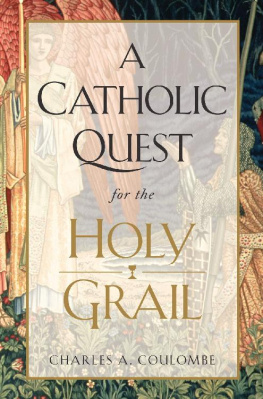

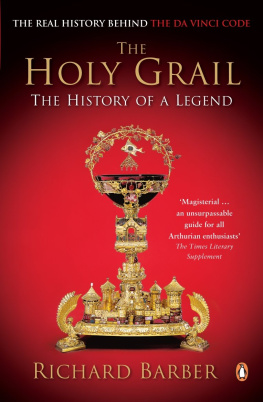
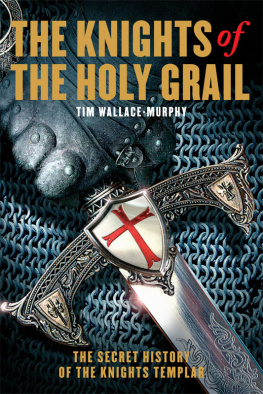
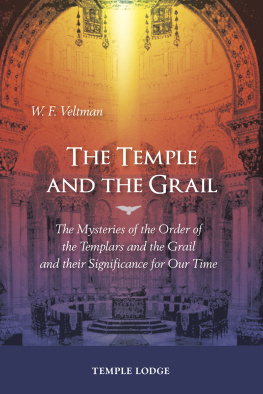
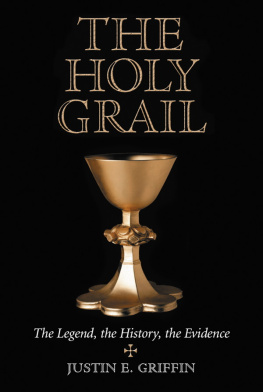
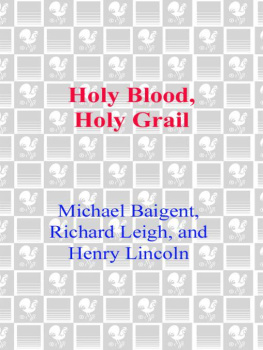
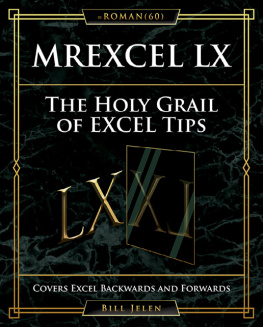
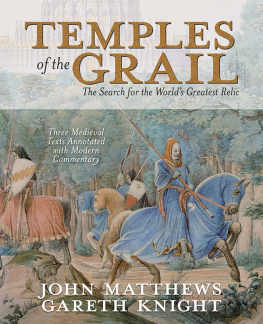
![Bernard Cornwell - The Grail Quest - The Archer’s Tale / Vagabond / Heretic [ATBC]](/uploads/posts/book/131313/thumbs/bernard-cornwell-the-grail-quest-the-archer-s.jpg)
